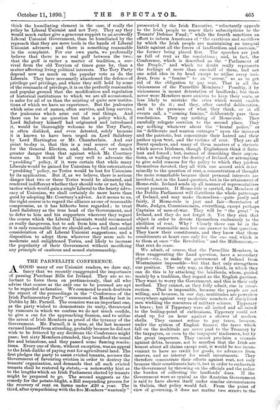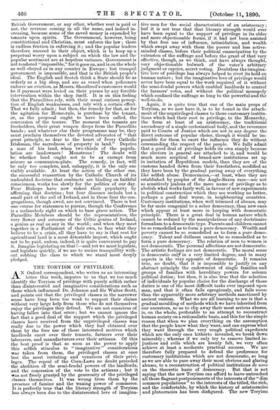THE PARNELLITE CONFERENCE.
AGOOD many of our Unionist readers, we dare say, fancy that we recently exaggerated the importance of passing Purchase Bills for Ireland. They are so re- luctant to force them on pertinaciously, that all who advise that course as the only one to be pursued are apt to be regarded as fanatics. We commend to such doubters the report of the proceedings in the "Conference of the Irish Parliamentary Party" summoned on Monday last in Dublin by Mr. Parnell. The occasion was an important one, as the party wished to demonstrate its unity, threatened by rumours in which we confess we do not much confide, to give a cue for the approaching Session, and to utilise the arrest of Irish Members as proof of the tyranny of the Government. Mr. Parnell, it is true, at the last moment excused himself from attending, probably because he did not wish to be fettered by any decisions the Conference might pass; but sixty Members attended, they breathed the usual fire and brimstone, and they passed some flaming resolu- tions. Every one of them, without exception, was an appeal to the Irish dislike of paying rent for agricultural land. The first pledges the party to assist evicted tenants, accuses the Government of favouring eviction in order to destroy the tenants' organisation, and demands that all such evicted tenants shall be restored by statute,—a noteworthy hint as to the lengths which an Irish Parliament elected by tenants might be prepared to go. The second suggests as the remedy for the potato-blight, a Bill suspending process for the recovery of rent on farms under £20 a year. The third, after sympathising with the five Members " wantonly " prosecuted by the Irish Executive, "reluctantly appeals to the Irish people to renew their subscriptions to the Tenants' Defence Fund ; " while the fourth sanctions an effort to inform Americans of "the exertions and sacrifices by which the Irish people are maintaining an unequal battle against all the forces of landlordism and coercion," the former being placed first. The speeches are just as full of rent as the resolutions ; and, in fact, the Conference, which is described as the "Parliament of the People," and which no doubt really represents the feelings of more than one-half of them, had not one solid idea in its head except to utilise every inci- dent, from a " famine " to an "arrest," so as to get rid, of the obligation to pay rent. That is all the viciousness of the Parnellite Members ? Possibly, if by viciousness is meant detestation of landlords ; but there never were Members more anxious to keep their seats, or less _likely to mistake the cries which would enable them to do it ; and they, after careful deliberation, and in • the presence of what they think, or at all events call, a "coming famine," deliberately pass these resolutions. They say nothing of Home-rule. They carefully relegate coercion to the second place. They say nothing whatever about the "brutal police," or its "deliberate and wanton outrages" upon the innocent and the patriotic, but concentrate their hatred and their pathos upon vent, and the victims of rent. They arc all fluent speakers, and many of them masters of a rhetoric which moves Irishmen, though Englishmen think it flatu- lent and forced ; but, instead of describing their aspira- tions, or wailing over the destiny of Ireland, or attempting to give solid reasons for the policy to which they profess themselves devoted, they all with one accord stick deter minedly to the question of rent, a concentration of thought the more remarkable because their personal interests are involved, not in the Land question, but in the attainment of Home-rule. Ireland sends up all manner of representatives except peasants. If Home-rule is carried, the Members of the Dublin Parliament will distribute the whole patronage of Ireland, and may make themselves—quite justly and fairly, if Home-rule is just and fair—Secretaries of State, Judges, Commissioners, everything, except perhaps Captains of men-of-war. They will be "the great" in Ireland, and they do not forget it. Yet they sink that object in order to devote themselves exclusively to the abolition of rent. Why ? Clearly there can be in the minds of reasonable men but one answer to that question. They know their constituents, and they know that those constituents at heart care only for the one end, which is to them at once "the Revolution" and the Millennium,— that rent do cease.
We admit, of course, that the Parnellite Members, in thus exaggerating the Land question, have a secondary object—viz., to make the government of Ireland from Westminster impossible—but that fact only strengthens our position. The only way, as they think, in which they can do this is by attacking the landlords, whom, guided mainly by a tradition, they regard as the English garrison. They want to worry the Government, and this is their only method. They cannot, as they fully admit, rise in insur- rection. That is impossible, because the people are not willing, and because, in our clay, multitudes are powerless everywhere against very moderate numbers of disciplined men wielding the resources of military science. Tipperary is brave ; but if Tipperary were all united and all raised to the boiling-point of enthusiasm, Tipperary could not stand up for an hour against a shower of modern shells. They cannot refuse to pay taxes, because, under the system of English finance, the taxes which fall on the multitude are never paid to the Treasury by the taxpayers, or even by the taxpayers' tradesmen, but by the great importers. They cannot proclaim a crusade against debts, because, not to mention that the Irish are honest about all claims except rent, it would be too incon- venient to have no credit for goods, no advances from usurers, and no interest for small investments. They therefore concentrate their efforts against rent, not only because their constituents hate it, but in order to embarrass the Government by throwing on the officials and the police the burden of collecting the landlords' dues. If the Government were as cynical as the 'Austrian Government is said to have shown itself under similar circumstances in Galicia, that policy would fail. From the point of view of governing, it does not matter two straws to the British Government, or any other, whether rent is paid or not, the revenue coming in all the same, and indeed in- creasing, because some of the saved money is expended by tenants upon spirits. The Government, however, being constitutional and Christian, must enforce the law ; there is endless friction in enforcing it ; and the popular leaders therefore succeed in their object, which is to keep up a perpetual worry upon a subject on which the law and the popular sentiment are at hopeless variance. Government is not rendered "impossible," for it goes on, and is on the whole as well obeyed as in any country in Europe ; but tranquil government is impossible, and that is the British people's ideal. The English and Scotch think a State should be as orderly as a big shop, and are as vexed when policemen enforce an eviction, as Messrs. Shoolbred's customers would be if payment were levied on their purses by any forcible intervention within the shop itself. It is on this feeling that the Parnellites rely, with their usual curious percep- tion of English weaknesses, and rely with a certain effect. That we fully admit ; but then, the remedy for that, as for the agitation for Home-rule, is purchase by the tenant, Or, as the proposal ought to have been called, the conversion of the tenure. The moment the tenants are freeholders, their great weapon drops from the Parne]lite hands ; and whatever else their programme may be, they must proclaim themselves the devoted advocates of "that great principle, so dear to the heart of'every Catholic Irishman, the sacredness of property in land." Deprive a man of his land, when two-thirds of the popula- lation are landowners ! Monstrous ! The doubt will be whether land ought not to be as exempt from seizure as communion-plate. The remedy, in fact, will be only too complete, and, unhappily, it is the only one visibly available. At least the action of the other one, the successful reassertion by the Catholic Church of its undoubted doctrine that contracts are binding on faithful consciences, works too slowly for the politics of our day: Four Bishops have now risked their popularity by affirming that doctrine ; but .four dioceses include but a small part of the soil of Ireland, and in those four the con- gregations, though awed, are not convinced. There is but one course for statesmen to pursue, though the Conference is a melancholy sight on which to base grave action. The Parnellite Members should be the representatives, the very flower and outcome of the Celtic genius of Ireland, a genius as real as any in the world ; and when they meet together in a Parliament of their own, to face what they believe to be a crisis, all they have to say is that rent for agricultural land is a most detestable impost, which ought not to be paid, unless, indeed, it is quite convenient to pay it. Imagine legislating on that !—and yet we must legislate, and legislate quickly, if we are to secure tranquillity with- out robbing the class to which we stand most deeply pledged.



















































 Previous page
Previous page